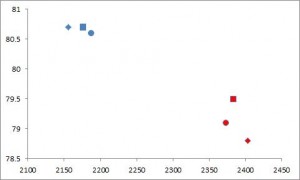We interrupt your regularly scheduled program for this urgent message: the National Health and Nutrition Examination Survey (NHANES) has issued a declaration of war.
Candy consumption was not associated with body weight measures, risk factors for cardiovascular disease, or metabolic syndrome in US adults: NHANES 1999-2004. (O’Neil et al., 2011 Nutrition Research)
en guard
OK, jk, the title of this manuscript is certainly eye-catching, but after a few days of brooding, plotting, and scheming, and some sleepless nights, I’ve come to the conclusion that while it may be “eye-catching,” it’s really not saying very much.
NHANES is a government run program that has been going on forever and is basically an enormous database of diet, health, disease, etc., risk factors, and is used to make nutrition or health recommendations. There have probably been a million publications using data from NHANES.
This study included roughly 15,000 people over 18 years of age and had a follow-up period of 5 years. They divided participants into 6 groups: people who ate candy and chocolate, those who ate only candy, those who ate only chocolate, and the people who did the opposite (e.g., those who didn’t eat only candy).
Sugar candy was defined as flavored/colored, crystalline/semisolid, sugar (e.g., peppermint, lollipops, licorice, gum drops, etc.). Chocolate candy was defined as a mixture of cacao, cocoa butter, sugar and some extra’s (nuts, milk, fruit, caramel, etc.).
Reason #1 why this study isn’t saying very much: we are not talking about a Halloween pillow case or Easter basket full of candy. Not even close. More like 4 Hershey Kisses, or 1 Reese’s Peanut Butter Cup (not even the whole package). On average, everyone in the total population eats less than one serving per day which means that on most days no candy or chocolate is eaten at all. This seems like a very low threshold for deeming someone to be a candy consumer, but it still includes about 10 – 20 % of their population. Think of 10 people you know personally (friends, family, co-workers), how many of them have eaten candy in the past 48 hours? If your answer includes more than 1 person, then these data don’t apply because the study population is not representative of the population from whence you hail. phew! Without going any further, I think this one point disqualifies the applicability of these results for about 95% of internet-accessing people.
If it looks like a duck, quacks like a duck, and you’re still not sure, send me the link.
Other anomalies in their data:
(divide and conquer)
Of course it’s perfectly plausible for one subgroup of people to eat significantly more yet weigh less than another subgroup selected from the same population, but how likely is that to occur in all 6 subgroups above?
More simply, here is a graph of calorie intake vs. body weight:
Blue, nonconsumers; Red, consumers; Diamond, total candy; Square, chocolate only; Circle, sugar only.
In each case, the blue symbols (nonconsumers) eat less but weigh more than the red symbols (consumers). The only “normal” outcome, i.e., where those who eat more also weigh more, is comparing the red circle (people who eat both candy and chocolate) to the red square (people who eat chocolate but not candy). I’m not saying these data are incorrect or were falsified, I’m just saying they are unique. And when graphed this way, it is easy to see that consumers are eating over 150 more kilocalories per day than nonconsumers despite weighing ~2 pounds less.
Given the old (outdated) relationship between the amount of additional kilocalories required to gain one pound of fat mass, a difference of 150 kilocalories per should result in an additional pound of fat gained every 24 days… (which could theoretically be prevented by running an additional 1.5 miles every day) … yet those people are 2 pounds lighter
Furthermore, the candy consumers weigh significantly less and are more active, so their risk for a variety of metabolic disorders should be reduced, right? Nope:
Candy: 0
Nutrition: 1
Will eating a piece of candy every day make you fat? No. Will stressing out about food or abandoning indulgences improve your health or quality of life? Certainly not. Do I feel all preachy now? yes, a little.
Calories proper


